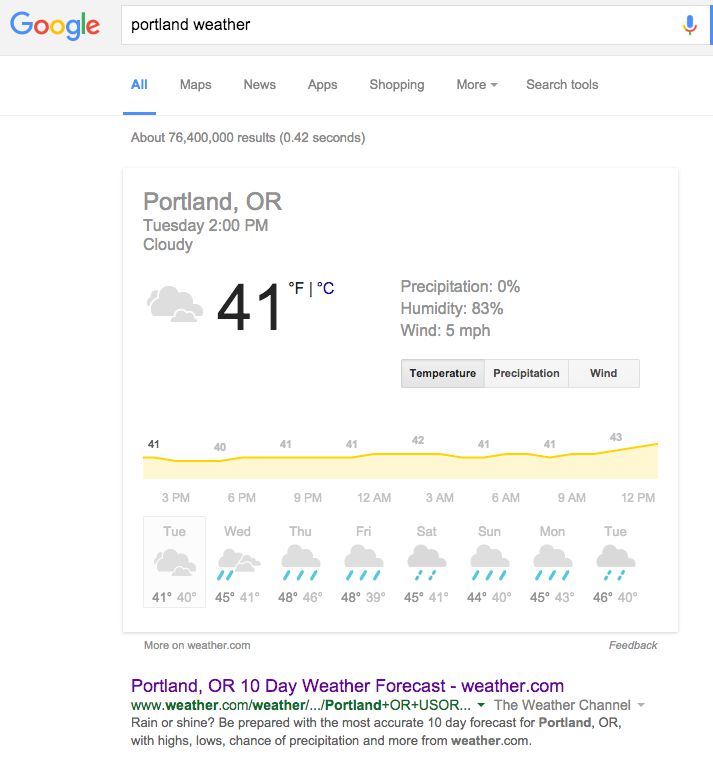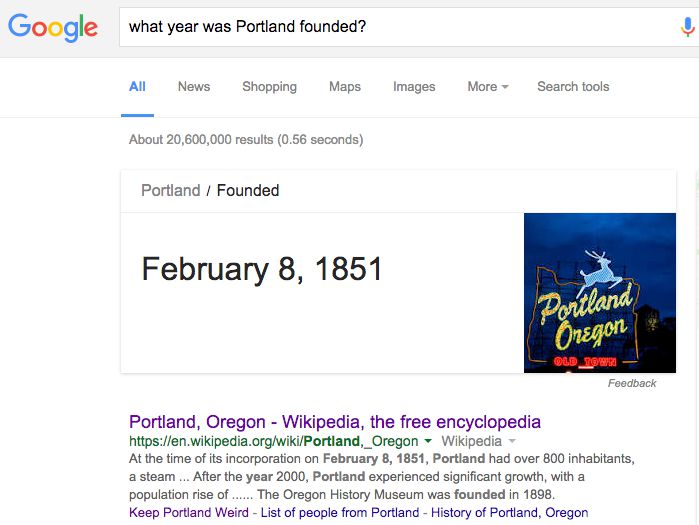Advancements within Google and other search engines are equally as inevitable as the advancement of our calendars.
Therefore, with 2016 fast approaching, let's dive head first into the most important search engines trends of the upcoming new year and consider how those trends will contribute to the evolution of the SEO industry.

1) More Answers Directly Within the Results
What started as a snowball rolling downhill in 2015 will turn into an avalanche in 2016.
In the past 18 months Google has increased its experimentation and sophistication in yanking snippets from websites and displaying them directly within the SERP.
Doing so eliminates three entire steps from the knowledge-seeking process: 1) Scanning the results and deciding which website to click. 2) Actually clicking on a website and waiting for it to load. 3) Orienting yourself to the website after it loads and subsequently scanning for the information you desire.
Historically those three steps have been so fundamentally ingrained into the mindset of utilizing a search engine that they seem like an insignificant burden.
However, in the efficiency-focused eyes of Google, every step is a burden regardless of how deeply its roots are planted in the process.
A perfect example are popular weather-related queries. Google has almost single-handedly slayed the weather giants Weather.com, Accuweather, and other once-formidable weather heavyweights simply by displaying upcoming forecasts directly in the search engine results page.
For example, a search for "Portland weather" yields the following result:

Google has immediately answered my question, thereby preventing me from engaging in the cumbersome process of clicking on a website (or various websites) to locate the same information.
Easy. Fast. Relevant.
The real challenge is attempting to understand more complex queries, which has become Google's central theme and predominant goal of 2016.
For example, Google also understands the slightly more complex query "what year was Portland founded?" and once again answers my question directly within the SERP.

As the queries become more complex, the conciseness of Google's answers also become slightly more convoluted, as evidenced by the deeper search "how many breweries are in Portland?"

In this case, Google is displaying an entire paragraph of information from a website that it deems an authority on the subject. However, unlike the previous examples, the specific answer that I desire is not "front and center". Instead it is sandwiched between sentences containing irrelevant information. This suggests that Google is either a) failing to understand the very specific nature of my query, or b) failing to pull only the information that I desire into the SERP.
In 2016, Google will parse through that information with even more laser-like efficiency. It is both reasonable and likely in 2016 to expect this same query (and others of similar complexity) to include only the desired information, as seen with the my other two queries.
2) RankBrain
Google has confirmed publicly that it recently launched an entirely new artificial intelligence system called "RankBrain" to assist with the process of determining rankings. RankBrain does not replace the Hummingbird algorithm that launched in August 2013, but rather exists as an addendum within it to help process highly advanced and highly ambiguous queries.
In a stunning moment of transparency, Google senior research scientist Greg Corrado admitted in a October 2015 Bloomberg article that RankBrain is now the third most important ranking signal (out of hundreds) that determines a website's position on a SERP. It is a safe to assume that PageRank, ever-evolving system that evaluates the volume and the quality of links pointing to your website, is also a top-3 factor. The other mysterious "third signal" remains a mystery.
What does the now vitally important RankBrain engine actually do? The answer, of course, is muddled.
"What does the now vitally important RankBrain engine actually do? The answer, of course, is muddled." (CLICK TO TWEET)
RankBrain is a self-teaching artificial intelligence system that converts language into mathematical entities. Consequently when RankBrain encounters a word or a long-tail phrase that it fails to recognize, its self-teaching system makes an educated guess as to what words and phrases have similar meanings based on its formulas, then ranks websites accordingly.
Approximately 15% of queries entered into Google are highly complex and/or never-seen-before by Google, according to Carrado, and the RankBrain system was launched with the goal of answering those more highly complex queries. However, rankings for "simplistic" searches are being affected as well.
It is safe to assume the RankBrain system will evolve significantly over time, much like the PageRank system has evolved since 1998. However, because RankBrain launched less than 100 days ago, its evolutionary curve is likely to be sharp in the coming months. In 2016 I expect Google to make significant adjustments to RankBrain as its strengths and flaws are identified and then reinforced via hard data, therefore contributing to a further shifting of the ranking landscape.
Of course, there are countless other "less significant" trends that will affect Google and other search engines in 2016, which I will cover in my next blog. However, for the sake of conciseness, it is a fair summary to state that "informational SERPs" and RankBrain will dominate the SEO landscape in 2016.
Stay tuned to GRAYBOX in 2016 to follow all of the latest search engine trends!
